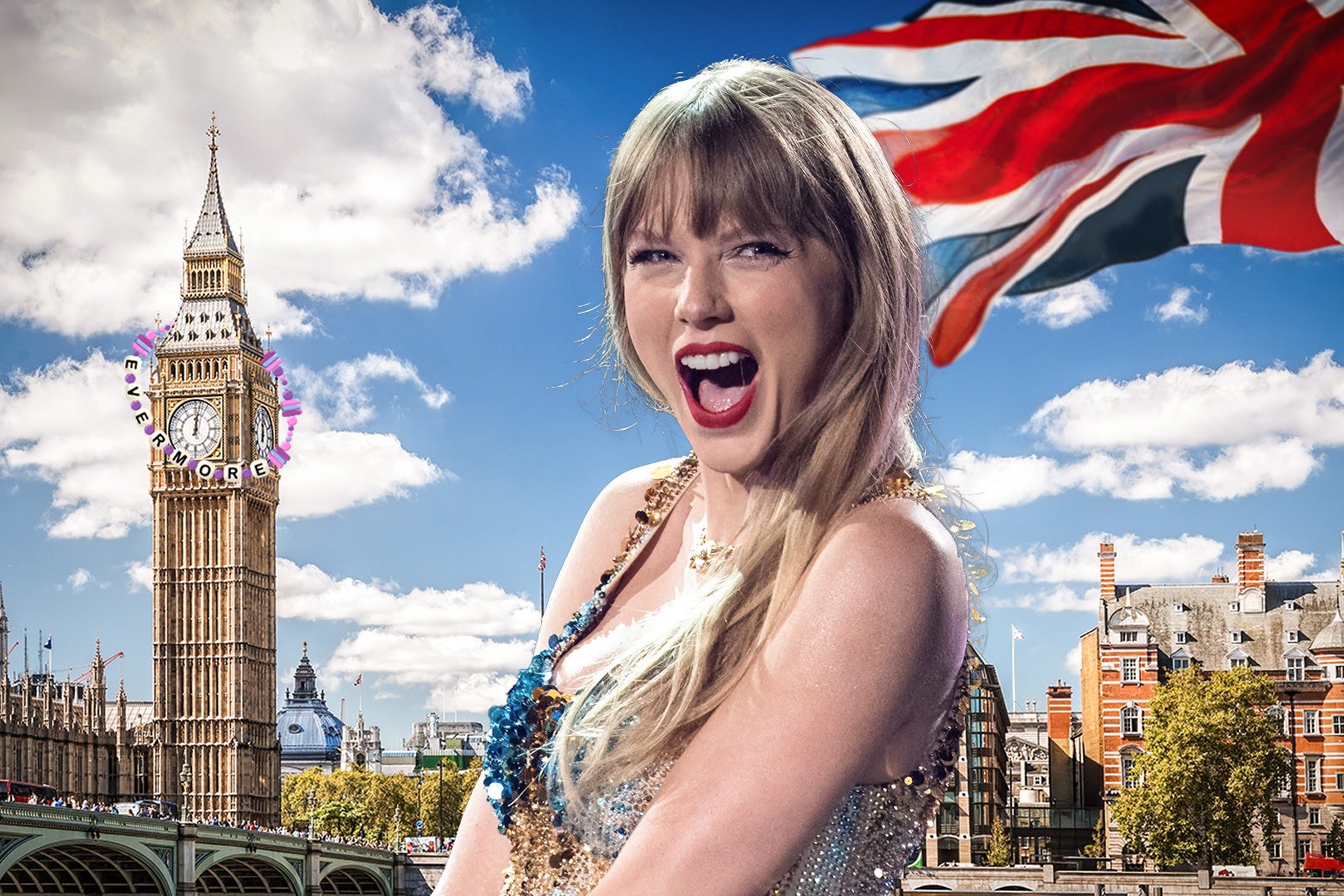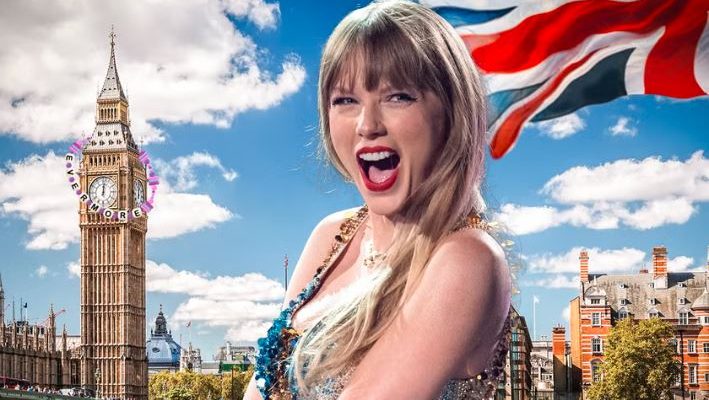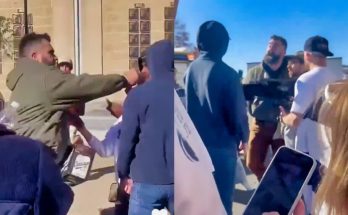The Taylor Swift Economy Has Overtaken London. I Went to Its Epicenter.

Taylor Swift is in London. Even the least culturally clued-in person could not have failed to notice. The city is full of people in “Eras” merch, and social media is awash in concert footage from the tour dates at Wembley Stadium: Travis Kelce donning a top hat and tails to make his own onstage debut, Prince William celebrating his 42nd birthday by shaking it off in his private box. We’ve got an election going on here at the moment, so candidates are busy doing things in public to appear maximally normal. Keir Starmer, leader of the opposition, posted a photo of himself on what he described as a “Swift campaign pitstop” at the “Eras” tour on Friday. Mayor Sadiq Khan posted a version of London’s underground map with all the stops replaced by Taylor Swift song titles and captioned it “London (Taylor’s Version).” For better or worse, this has indeed felt like her town, for a weekend.
But one specific place in London is an interesting Petri dish in which to examine the Taylor Swift effect. Before April of this year, the Black Dog pub, in south London’s Vauxhall neighborhood, was an unremarkable sort of place. I live nearby and had been once or twice before. It’s a local joint that does decent food and serves beer—just a pub, in other words. However, after Swift released The Tortured Poets Department, the establishment found itself catapulted to international recognition. The extended, Anthology edition of the album features a song called “The Black Dog,” in which Swift as narrator describes realizing that a lover—presumably one of the two Londoner boyfriends that most of the album is about—had forgotten to turn off location sharing, and she then works out that he is cheating on her by tracking him to a bar by that name.
I went down this past weekend to see whether there would be any Swifties at the pub before or after their “Eras” experience and, if so, to ask them to explain themselves. As I walked over there, at 3 p.m. on Saturday, I sort of expected to be disappointed. Why would people in London for a weekend, some of them from as far afield as the States, spend any of their precious time at a bog-standard pub in a part of town well off the tourist trail? Surely they had better places to be? This was just a bonus track, after all.
I need not have worried. The Black Dog was swarming with groups of friends with “Eras” tote bags; mums and their tweenage daughters in “Eras” T-shirts; beleaguered boyfriends taking photographs of their girlfriends, all their arms bedecked in lettered bands spelling out their favorite albums and songs and lyrics. On the grass outside the pub, there were even a handful of girls stringing together more of these friendship bracelets. Inside, it was even busier, and anyone hoping for a table without a reservation was kidding themselves.
The pub sells merchandise now: pink Black Dog baseball caps, pint glasses embossed with the establishment’s logo, and, of course, friendship bracelets. Taylor Swift plays over the speakers. According to one staff member wearing a Black Dog friendship bracelet, it has been busy not just all weekend but all month. Swift fans seeing the tour elsewhere on the Continent have been incorporating the concert into a wider holiday, stopping in London on their own European tour. There was a somewhat harassed-looking security guard in an orange cap outside yelling at the Swifties to stay out of the way of cars as they got their pictures taken with a sign with the lyric “And so I watch as you walk into some bar called the Black Dog.” The guard was himself wearing a full sleeve of letter beads that fans had given to him, including one wristlet that read “Go Chiefs,” a phrase that holds no meaning for most Londoners. As I stood there, three South African women in “Eras” merch were debating which of theirs to bestow upon him. “Give him ‘King of My Heart,’ ” one said. “It will match his hat.”
I spoke to Michelle and Tammi, sisters based in Tennessee and Florida, who were there with their daughters. They were in London to see Swift the following night, and would be around till Tuesday. Maya, one of the daughters, said that “The Black Dog” was her favourite song of all, so this was the one thing she wanted to do in the city other than see the concert. They were going to the stadium that night too, to listen from outside.
This kind of tourism feels like a relatively new thing, in Europe anyway. It happened with Beyoncé’s tour as well: droves of concertgoers traveling to European cities they were otherwise not very interested in, such as the people who flew out specifically for the Stockholm show that kicked off the “Renaissance” tour. But this feels like another level in terms of numbers. This summer, 700,000 are expected to attend the “Eras” tour over the eight dates it will be in London, this month and again in August. A huge portion of that audience will be coming from abroad. Tickets to the European leg of the “Eras” tour are significantly cheaper than they are in the U.S., to the extent that many did the maths and worked out that it would be a better value to get “Eras” tickets in Europe and fly over for the concert. The Greater London Authority estimates that the tour will generate 300 million pounds for the economy, and last week the European Central Bank’s chief economist was heard musing about the megastar’s potential effect on inflation. Swift-themed functions this past weekend included a Taylor Swift drag brunch; a Taylor Swift mini-golf and cocktail event; a Taylor Swift traveling bar bus tour of London; and an adult ball pit experience with Taylor Swift music playing, as well as both warmup parties and after-parties for each concert. I cannot recall another occasion when one person’s presence in a city has kicked off such an enormous response of ancillary events and cash-in attempts. It is no exaggeration when everyone from CNBC to the New York Times writes about her as not just a pop star but an entire economy.
Three women from Ottawa told me that they had thought about coming to the Black Dog during their weekend in London but had bumped it up the agenda to that day because Swift had sung “The Black Dog” the previous night, as one of the two surprise songs she performs at each tour date. I sat down on a bench outside the pub with a group of fans, some from the U.S. and some from London, who had met one another there that day. They had all seen the show the night before. “Tortured Poets is my favorite album,” a woman in her early 20s named Lily told me, “and we were like, ‘We have to visit the Black Dog.’ Just seeing that this is where she wrote about—it’s crazy. I almost imagine, like, this is the vibe of Tortured Poets, you know what I mean? It’s like the album in real life.”
Two other Swifties, Rachel and Ashley, found out they had gotten off the waitlist for London tickets on Thursday at 11 a.m. in New York. “We bought the tickets and flew here that night. We were in the airport by 4,” Rachel said. They got married last month. “Now we’re like, I don’t know—we thought we had the best night of our life? And then last night happened.” They wanted to come and see the Black Dog because they found the song relatable. “She was stalking her boyfriend, and, like, that’s the most human thing. I’m always looking at my Find My Friends like, Where’s everybody at, what are they doing?”
Another group, friends from London, sat on the lawn with their pints. “I suggested the Black Dog to these two,” said Zoe, pointing to the other women with her, “and they were like, ‘We don’t know what you’re talking about.’ I was like, ‘It’s where Taylor got cheated on. It’s very important to us!’ ” She wasn’t at all surprised it was busy. “I thought it would be busier, to be honest.”
I guess for all these fans, coming to the Black Dog is a way to (let’s be real) get some Instagram pictures—but also to feel just a tiny bit closer to Swift. And her stardom is so astronomical that such feelings can be elicited just by a beer drunk from a plastic cup on some grass outside an unremarkable boozer.
When the “Eras” tour comes to a city, it creates this strange sense of us—the regular locals—and them, the world’s Swifties. As I stood outside the Black Dog, a group walked past.
“It’s crazy that there are so many people, and they’ve got so many bags,” one of the girls said to the others. One of her friends replied: “Imagine being the owner of this pub. They probably hate it.”
They don’t, apparently. Back when the song was released and the pub first started getting Swiftie visitors, the pub’s events manager, Lily Bottomley, told the BBC that the attention had been “pretty overwhelming” but that the bar “can’t be happier,” by which she presumably at least in part meant: “We are making a lot of money.”
People eating on the terrace outside an adjacent café were craning their necks to see what the fuss was about. One customer got up and walked over to an American woman wearing friendship bracelets.
“What’s all this?” the customer said in a south London accent.
“Oh, it’s because of the Taylor Swift song,” the American woman replied.
“All right,” the Londoner said before retur



